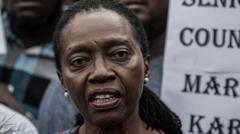**The Dutch political landscape faces upheaval as the governing coalition disintegrates following disagreements on immigration measures led by Geert Wilders.**
**Far-Right Leader Geert Wilders' Exit Topples Dutch Government**

**Far-Right Leader Geert Wilders' Exit Topples Dutch Government**
**The resignation of Prime Minister Dick Schoof comes after coalition disputes over asylum policies.**
The Netherlands has been plunged into political chaos after Geert Wilders, leader of the far-right Freedom Party (PVV), exited the ruling coalition, instigating a government collapse. Prime Minister Dick Schoof announced his resignation on Tuesday, formally offering his cabinet's resignation to King Willem-Alexander. Wilders' departure follows a contentious dispute regarding the coalition’s immigration policies, particularly his demands for stricter asylum measures.
In a statement to the public, Schoof labeled Wilders’ decision as "irresponsible and unnecessary," emphasizing that the coalition had only lasted 11 months since its formation last July. The coalition featured Wilders' PVV alongside the conservative-liberal VVD, the Farmers' Citizen Movement (BBB), and the centrist New Social Contract.
The tensions escalated when Wilders proposed ten additional asylum measures, including a halt on new applications and the cessation of building reception centers. Many coalition partners voiced their frustration, noting that most of Wilders' demands echoed policies already agreed upon in their governing pact. They underscored that other suggestions had previously been rejected during negotiations due to legal issues.
The political community expressed its astonishment and anger at the sudden breakdown. VVD leader Dilan Yesilgoz criticized Wilders’ actions, labeling them "super irresponsible" and suggesting that his motivations transcended mere asylum policy. Deputy Prime Minister Mona Keijzer from the BBB accused Wilders of betraying national interests.
Despite backlash, Wilders has positioned himself to capitalize on the situation, declaring his intent to lead the Netherlands and expand the influence of the PVV in upcoming elections. Experts indicate the immediate economic impact of this government shift appears limited, given the lack of substantial policy initiatives during its time in office.
The survival of Schoof's ministers in a caretaker role is anticipated until elections are scheduled, likely later this autumn. As the Netherlands gears up for upcoming polls, the prospect of Wilders forming alliances may be hindered by perceptions of self-interest overpowering national stability, particularly after his controversial exit over asylum negotiations.
The approaching NATO summit in The Hague adds urgency to the political landscape, as parties scramble to fill the void left by this governmental upheaval, with an uncertain future lying ahead for the Dutch political framework.





















